|
|
|
Sort Order |
|
|
|
Items / Page
|
|
|
|
|
|
|
| Srl | Item |
| 1 |
ID:
024810
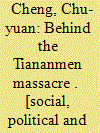

|
|
|
|
|
| Publication |
Boulder, Westview Press, 1990.
|
| Description |
xii, 256p.: ill., tableshbk
|
| Standard Number |
0813310474
|
|
|
|
|
|
|
|
|
|
|
|
Copies: C:1/I:0,R:0,Q:0
Circulation
| Accession# | Call# | Current Location | Status | Policy | Location |
| 032635 | 951.058/CHE 032635 | Main | On Shelf | General | |
|
|
|
|
| 2 |
ID:
123608
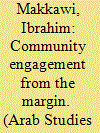

|
|
|
| 3 |
ID:
086707
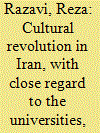

|
|
|
|
|
| Publication |
2009.
|
| Summary/Abstract |
The cultural revolution (1980-83), has been regarded by the elite in Iran as one major step towards the establishment of Islamic values in the universities. Twenty-eight years after those events, the elite in Iran are still struggling to implement their policies effectively in universities. The sudden rise in the political activities of the student movement during Mohammad Khatami's presidency (1997-2005) was in many ways a disappointing development for those who had initiated the cultural revolution. There was a general feeling that under the new president, Mahmoud Ahmadinezhad (2005-present), the student movement activities would decline. However, this has not been the case. The new upsurge in the activities of the student movement in Iran has raised a significant question: why has there been a revival in these activities under a more conservative social and political order? This article attempts to examine this central issue by re-examining the events that contributed to the rise and resistance to the cultural revolution. This article will also discuss contemporary materials and will highlight a number of different issues which will shed new light on the understanding of this topical subject.
|
|
|
|
|
|
|
|
|
|
|
|
|
|
|
|
| 4 |
ID:
178880
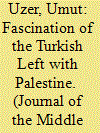

|
|
|
|
|
| Summary/Abstract |
This study analyzes the ideology and worldview of Turkish and some Kurdish militants of the Turkish socialist movement from the late 1960s until the early 1980s based on the memoirs of the protagonists. In these writings, we can observe the exuberance as well as the disappointments of these young militants and their approach to world affairs in general and Turkish and Middle Eastern politics in particular. In their worldview, America and its allies, especially Israel, were the real enemy whereas they purported to aspire to the creation of a socialist state in Turkey. The Turkish left-wing militants got involved in Palestinian politics through their training at the Palestinian camps in Lebanon, Syria, and Jordan as they perceived the Palestinian struggle against Israel as a part of the world-wide revolutionary movement for the overthrow of imperialism and its replacement by socialist governments all around the globe.
|
|
|
|
|
|
|
|
|
|
|
|
|
|
|
|
| 5 |
ID:
119901
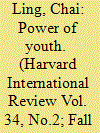

|
|
|
|
|
| Publication |
2012.
|
| Summary/Abstract |
On June 4, 1989, I fled through the streets of Beijing as government officials crushed the student movement we had so passionately held in Tiananmen Square. It was soon reported that our earnest attempt to have peaceful dialogue with our nation's leaders had been a total failure, though some still say otherwise. For 10 months, I hid underground in China, running for my life from those who should have protected us.
|
|
|
|
|
|
|
|
|
|
|
|
|
|
|
|
| 6 |
ID:
124299
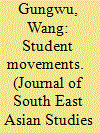

|
|
|
|
|
| Publication |
2013.
|
| Summary/Abstract |
For the past three decades, student movements in most countries in the world have been beaten back, but there are signs that some may be returning. In response to the Arab Spring, students participated fully in Tahrir Square and beyond. The student elections in Egypt that followed, however, seem to have been divided according to the various links that each student group had with the political groups contending for state power, like the Muslim Brotherhood and other Islamists on the one side, against secular and revolutionary groups on the other. It is not certain if the student elections really reflected the overall mood of the country or whether they were simply shaped by political protagonists outside the campuses.
|
|
|
|
|
|
|
|
|
|
|
|
|
|
|
|
| 7 |
ID:
189906
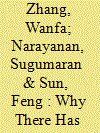

|
|
|
|
|
| Summary/Abstract |
Since the suppression of the student movement in 1989, there has not been any anti-regime or pro-democracy student movement for over three decades in China. What does this suggest? Apart from the known strengthened campus control by the authority which might have forestalled it to some extent, are there alternative reasons? Has the government drawn lessons from the past and since improved its governance, thus effectively enervated student motives to challenge the government? In order to demystify what is behind, the researchers conducted an extensive survey at over thirty-five universities across China from 2015 through 2018. Through analysing the 1,859 valid responses received, the study found that current college students give a high approval rating to the status quo of the country, and they also hold strong optimism for the future. This result may indicate that there is no strong incentive for them, like the generation of the students in the 1980s, to push forward any dramatic political, economic and social changes. The West may need to take this prospect into consideration in their interactions with China, which may enjoy a long period of relative stability without political challenges from college students in the foreseeable future.
|
|
|
|
|
|
|
|
|
|
|
|
|
|
|
|
|
|
|
|
|